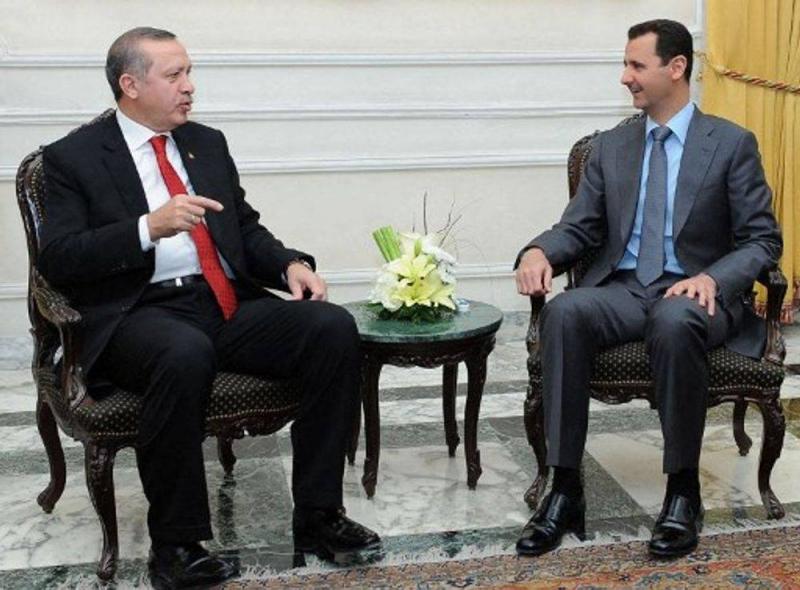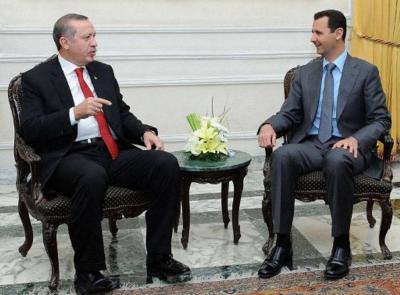Turkish President Recep Tayyip Erdogan's offers to restore relations with the Syrian authorities have gone beyond merely exploring opportunities; he has expressed intentions to invite his Syrian counterpart Bashar Assad to Turkey. Last week, Erdogan announced that he might invite Assad "at any time," without providing further details. A Turkish official confirmed on Tuesday evening that the timing for the meeting between the two presidents is "not specified."
So where and when will the meeting occur after 13 years of estrangement? Currently, Russia, along with Iraq, continues to play a mediating role in the possible rapprochement between Turkey and Syria, which could ultimately lead to a direct meeting between Erdogan and Assad. The spokesman for Erdogan's ruling Justice and Development Party, Omar Celik, stated that this anticipated meeting would be the first of its kind since the outbreak of the Syrian war.
Political analyst and Turkish affairs researcher Khorshid Deli commented that Baghdad is not the suitable venue for this meeting, despite its significant role, especially since Erdogan does not wish to grant an Arab and Iranian depth to such a step. He added that, on the other hand, Baghdad does not appear to be politically influential over Damascus, unlike Moscow, which has an influential network of relations and interests linking both Syrian and Turkish sides.
Deli further expressed that the meeting between Assad and Erdogan is likely to take place at the table of Russian President Vladimir Putin, considering that Russia is leading the mediation efforts between them. He also noted that Putin aims for this meeting to bring a shift in Russian and regional policies regarding the Syrian crisis and to achieve a significant leap in his Eurasian policies.
The timing of the meeting is related to reaching agreements on a roadmap between the Turkish and Syrian sides. He pointed out that Turkish political circles are currently witnessing an unprecedented Turkish initiative, whereas the Syrian side is more cautious and deliberate in its calculations.
The political analyst highlighted that attention is now focused on meetings regarding the establishment of a framework for understanding amidst many challenges, a difficult legacy of the relationship, and a lack of trust. He suggested that the appropriate timing for Russia to hold a meeting between Assad and Erdogan might be before the U.S. presidential elections, as Putin seeks to place the upcoming American administration, regardless of the identity of the winner, in front of this significant issue.
These analyses came after a Turkish newspaper close to the ruling party reported on Tuesday that Turkish-Syrian talks preceding the Erdogan-Assad meeting would be held at the level of the foreign ministers of both countries, following meetings between other Turkish and Syrian officials. The Turkish newspaper "Yeni Şafak" mentioned that a series of meetings concerning the anticipated encounter between both presidents would take place in the upcoming period under Russian sponsorship.
Furthermore, President Erdogan reiterated his invitation to Assad upon returning from Germany, where he watched the Turkey-Netherlands match during the UEFA European Championship, stating, "We may invite Assad at any time." Erdogan explained to journalists that Russian President Vladimir Putin's potential visit to Turkey could open a new chapter in Turkish-Syrian relations.
For his part, Syrian President Bashar Assad, following his reception of Russian envoy Alexander Lavrentiev last Wednesday, confirmed Syria's openness to all initiatives related to its relationship with Turkey based on Syrian state sovereignty and what Damascus has demanded from Ankara. Assad clarified that the goal is to successfully restore relations between Syria and Turkey, emphasizing the necessity of combating all forms of terrorism and its organizations.
It is notable that at the onset of the conflict in Syria in 2011, Ankara provided essential support to the political and military opposition and has conducted three major military operations in Syria since 2016, primarily targeting Kurdish fighters. Turkish forces, in cooperation with Syrian factions loyal to them, managed to control a vast border area in northern Syria. Meanwhile, Damascus insists on complete Turkish withdrawal before any negotiations can take place.




